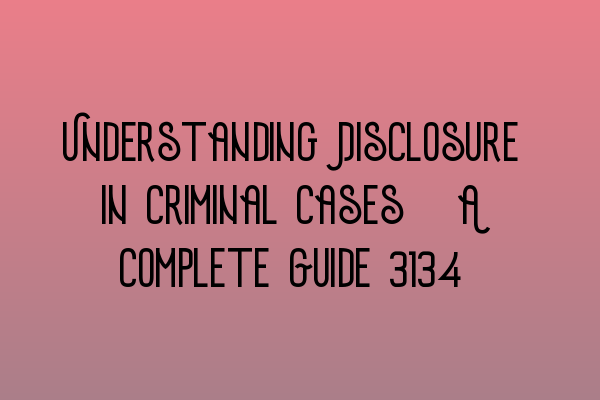Understanding Disclosure in Criminal Cases: A Complete Guide 2023
In the realm of criminal law, one of the most critical aspects of any case is disclosure. Understanding and mastering the concept of disclosure is essential for both prosecution and defense to ensure a fair and just trial. In this complete guide for 2023, we will delve into the intricacies of disclosure, its significance, and how it impacts criminal cases in the UK.
What is Disclosure?
Disclosure refers to the process of sharing relevant information and evidence between the prosecution and defense in criminal cases. It is a legal obligation for both parties to provide and disclose any material that may be favorable or detrimental to the other’s case. This exchange of information promotes transparency, helps prevent wrongful convictions, and ensures a fair trial.
The Importance of Disclosure
Disclosure plays a crucial role in the pursuit of justice. It allows both the prosecution and the defense to assess the strength of their case, make informed decisions, and prepare for trial effectively. By sharing evidence in a timely and comprehensive manner, the parties can avoid surprises or ambush tactics that could lead to unfair outcomes.
Disclosure Obligations
In the UK, disclosure obligations are primarily governed by the Criminal Procedure and Investigations Act 1996 (CPIA) and the Code of Practice. The CPIA sets out the obligations for both the prosecution and the defense, emphasizing the importance of early and ongoing disclosure.
The prosecution’s duty of disclosure includes providing the defense with all material evidence in their possession, regardless of whether it supports the prosecution or defense case. This includes witness statements, expert reports, CCTV footage, forensic evidence, and any other relevant information.
On the other hand, the defense also has a duty to disclose any material that may undermine the prosecution’s case or assist their defense. This can include alibi evidence, witness statements, or expert reports.
Different Types of Disclosure
There are three main types of disclosure that can take place during the course of a criminal case:
1. Initial Disclosure: This is the initial exchange of information between the prosecution and defense at the early stages of the case. It includes the provision of key material that the parties rely on.
2. Continuing Disclosure: As the case progresses, new evidence may emerge, or existing evidence may require updating. This ongoing disclosure process allows for the exchange of additional material.
3. Unused Material: This refers to material that the prosecution has gathered or considered during their investigation but does not intend to use in court. The defense has the right to access this material as it may be critical to the case.
Challenges and Limitations
While disclosure is a vital component of a fair trial, there can be challenges and limitations to its implementation. The volume and complexity of evidence in modern criminal cases, especially with the advent of digital technology, can make disclosure a mammoth task. Furthermore, issues related to privilege, sensitive information, or national security may restrict the extent of disclosure.
The Consequences of Failure to Disclose
Failure to fulfill disclosure obligations can have serious consequences for the integrity of the criminal justice system. A failure to disclose timely and relevant material can lead to wrongful convictions, wasted court time, and undermine public confidence in the fairness of trials. Courts have the power to impose sanctions, including adjourning trials, excluding evidence, or even staying proceedings if there is a serious or intentional violation of disclosure obligations.
Seeking Legal Advice
Given the complexity of disclosure in criminal cases, it is crucial to seek legal advice from experienced solicitors who specialize in criminal law. SQE Criminal Law & Practice Law UK provides comprehensive guidance and representation to navigate the disclosure process effectively.
To enhance your understanding further, we recommend exploring related articles on our website:
– SQE 1 Practice Exam Questions: Test your knowledge with our SQE 1 practice exam questions and assess your readiness for the examination.
– SQE 1 Practice Mocks FLK1 FLK2: Prepare for the SQE 1 exam with our practice mocks FLK1 and FLK2. Hone your skills and familiarize yourself with the exam format.
– SQE 2 Preparation Courses: For those aspiring to be solicitors, our SQE 2 preparation courses provide comprehensive training to handle practical and client-focused legal issues.
– SQE 1 Preparation Courses: Prepare effectively for the SQE 1 examination by enrolling in our SQE 1 preparation courses. Gain a solid foundation in the fundamentals of criminal law.
– SRA SQE Exam Dates: Stay up-to-date with the latest SRA SQE exam dates to plan and prepare for your forthcoming examinations.
Disclosure is an essential element of the criminal justice system. By understanding the process, obligations, and potential challenges, legal professionals can ensure the integrity of trials and uphold the principles of justice. With expert guidance from SQE Criminal Law & Practice Law UK, you can navigate the complexities of disclosure with confidence and skill.
Remember, a fair trial begins with comprehensive disclosure. Stay informed, seek legal advice, and equip yourself with the knowledge to champion justice.
